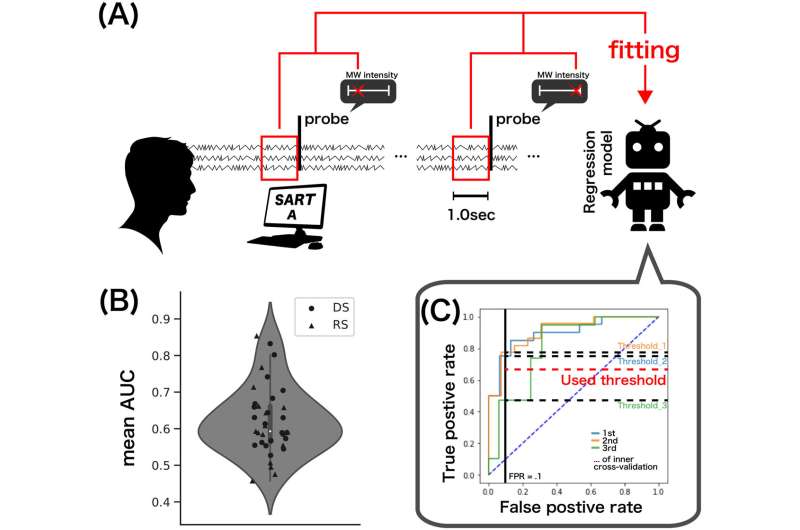This article has been reviewed according to Science X's editorial process and policies. Editors have highlighted the following attributes while ensuring the content's credibility:
fact-checked
proofread
Novel neurofeedback technique enhances awareness of mind-wandering

Everyone knows the feeling. You are trying to concentrate on driving or studying, or paying attention in a boring meeting, but suddenly, you realize that you are thinking about something irrelevant to the task at hand. While mind-wandering is sometimes associated with mental problems such as depression, it also contributes to creativity. Therefore, what people need is not to avoid mind-wandering, but to learn how to manage it.
The first step to control mind-wandering is to realize that it is occurring. Once we notice it, we are free to stop or to continue it. Scientists at ATR, have developed the first method, a neurofeedback technique, to enhance awareness of mind-wandering.
They performed a double-blinded test with 36 participants and demonstrated that awareness of mind-wandering was significantly enhanced after 20 minutes of neurofeedback. Participants were assigned by computer to control and experimental groups and those assignments were withheld from experimenters. During neurofeedback, artificial intelligence was used to identify mind-wandering in participants performing a task that requires concentration.
In the control group, soft tones were presented at irregular intervals. In the experimental group, those tones were sounded when neurofeedback detected that a participant's mind was wandering. However, until debriefing at the end of the experiment, participants in both groups were told that tones were meaningless and were instructed to ignore them.
Since people become aware that their minds are wandering at the time their attention was re-directed back to the external environment, the researchers hypothesized that this novel neurofeedback created a state in which participants become cognizant of mind-wandering whenever it occurred.
This study had two unique features. First, participants in the experimental group did not know that they had received neurofeedback and they didn't realize that their awareness of mind-wandering had been enhanced. Second, in conventional neurofeedback, participants obtain rewards when they control their brains well. In contrast, this neurofeedback experiment employed no rewards or punishments. Instead, it was based on traditional (Pavlovian) conditioning.
The work is published in the journal Neural Networks.
This study did not reveal how long effects of this neurofeedback persist, but probably they will not last long. However, future studies will examine whether repeated neurofeedback endures in daily life. The researchers plan to also explore training techniques to improve mood and mental problems and to enhance creativity.
More information: Issaku Kawashima et al, Pavlovian-based neurofeedback enhances meta-awareness of mind-wandering, Neural Networks (2022). DOI: 10.1016/j.neunet.2022.11.024


















